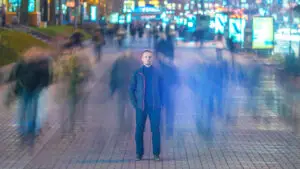When a loved one goes missing, the clock starts ticking – and every second that passes feels like an eternity. Those initial moments after their disappearance are absolutely critical. How swiftly you react can genuinely mean the difference between locating them safe and sound or suffering an utterly tragic outcome. In these nightmare situations, reaction time is everything.
The Crucial “Golden Hours”

Search and rescue professionals refer to the first 48 hours after someone goes missing as the “golden hours.” It’s during this make-or-break window that the chances of finding the missing individual alive and unharmed are at their absolute peak. However, as more and more time elapses, that once-hot trail grows devastating colder and colder, with the likelihood of a positive resolution plummeting rapidly.
Just envision this: You’re at home, and your teenage daughter doesn’t return from school at her usual time. You try calling her cell, but it rings and rings until it stops ringing altogether – going straight to voicemail. Those first few hours are paramount. You simply must spring into action immediately. Start working the phones, contacting her friends and their parents, checking all her usual hangout spots, alerting school officials and campus security, and notifying the authorities. Because every single minute squandered could potentially mean the difference between your daughter coming home safe tonight or the nightmare of her never coming home again.
The Catastrophic Risks of Delay

The reasons why such lightning-fast reaction time is utterly indispensable in missing person emergencies are multifaceted. Here are some of the most chilling concerns that grow increasingly severe with each passing hour:
- Exposure to the Elements: If the disappeared person is outdoors, out in nature, or in some unfamiliar environment, they may quickly become dangerously vulnerable to the brutal effects of exposure. Dehydration, hypothermia, or any number of other environmental threats could turn utterly life-threatening at breakneck speed. Prompt, rapid action is critical to locating them before these risks completely overwhelm them.
- Potential Foul Play: In cases where foul play like abduction or assault is a possible factor, those first few highly-perishable hours are absolutely crucial for gathering up any and all available physical evidence, actively tracking down even the dimmest of leads, and maximizing the chances of a successful rescue effort or apprehension of perpetrators. Losing that invaluable head start can drastically minimize any hope of resolution.
- Untreated Medical Emergencies: If the missing individual suffers from a known medical condition or requires regular medication to treat an illness or manage symptoms, a prolonged delay in locating them and getting them proper treatment could quickly turn a precarious situation into a fatal one.
- Confusion and Aimless Wandering: For those who go missing and struggle with cognitive disorders or diminished mental faculties like Alzheimer’s, dementia, or other impairments, prompt and immediate action is utterly essential to prevent them from wandering off far afield and becoming hopelessly lost, injured, or placed in harm’s way through confusion and disorientation.
- Critical Evidence Degradation: As more and more time stretches on following a disappearance, crucial pieces of physical evidence like footprints, tire tracks, broken branches, or other critical clues and markers can become inadvertently degraded, tainted, or even destroyed through continued environmental exposure. This makes retracing the missing person’s steps and establishing a tight timeline infinitely more difficult the longer the delay.
A Harrowing Case Study: Jaycee Dugard
To really underscore and highlight the absolutely paramount importance of rapid reaction time, one need only examine the decades-long, harrowing saga and abduction case of Jaycee Dugard. In 1991, 11-year-old Jaycee was suddenly and shockingly kidnapped from a bus stop just outside her home in South Lake Tahoe, California. Despite her family’s frantic efforts to immediately report her disappearance to authorities and the involvement of law enforcement to conduct an initial search, those early endeavors proved unsuccessful and the trail quickly turned ice cold.
In a national tragedy that absolutely shattered her loved ones, as well as weighing heavily on the hearts and minds of millions across the country following her case, Jaycee remained missing and held in captivity by her abductors for an almost incomprehensible 18 agonizing years. It wasn’t until 2009 that a chance occurrence and lead finally brought her unimaginable plight to a miraculous resolution.
While it’s impossible to say for certain whether or not an even swifter, more committed and well-coordinated response in those first few critical hours and days could have prevented Jaycee’s abduction entirely, this devastating case unquestionably underscores the dire need for an immediate, full-tilt, all-hands-on-deck approach to be unleashed at the first moment someone is discovered missing and potentially in peril. Every single solitary minute and second counts immensely – and a severely lacking or delayed reaction can quite literally enable the difference between freedom and tragedy.
The Fundamental First Steps: A Lifeline

When it becomes shockingly evident that someone you know and love has gone missing, taking the proper actions and precautions immediately can drastically and significantly improve the chances and outlook for a positive, relief-filled outcome and successful recovery. Here are some absolutely critical first steps that must be taken straightaway:
- Instantly Alert Authorities: The very moment you even begin to suspect a loved one has disappeared, pick up the phone and contact the police or other relevant authorities instantly – do not delay, do not hesitate, do not second-guess. Provide as much specific and thorough information as you possibly can, including a detailed physical description of the missing person, details about their last known whereabouts and what they were wearing, any potential risks or vulnerabilities they may face, known mental or physical conditions, and more.
- Rapidly Gather Information: As you and your family/friends are awaiting law enforcement’s arrival, work rapidly to collect and compile any and all relevant background information that could potentially aid and accelerate search efforts. This could include the missing person’s recent movements, activities, unusual behaviors, typical habits and routines, known associates and acquaintances they’ve been spending time with, and any potential conflicts, crises, or personal issues they may have been grappling with.
- Perform Immediate Neighborhood Searches: In addition to gathering background intelligence, you can also take the initiative to conduct an urgent self-coordinated search and canvassing of the immediate surrounding areas, investigating any potential hot-spot locations like their home, their place of work, known hangouts and favored spots, neighboring residences, wooded trails, parks, and other such similar locales. Keep a watchful eye out for any potential clues, evidence, or indicators that could help establish what happened and where they may have gone.
- Distribute Information Widely and Rapidly: Sharing the missing person’s information, including clear physical descriptions and up-to-date photographs, with both your close circles of trusted family and friends as well as throughout the broader community is another critical step. In today’s digital world, leveraging social media and local news/media platforms to rapidly spread awareness and circulate these crucial details could mean the difference between a well-coordinated community-wide search effort and the missing person becoming a chilling cold case.
- Preserve Any Potential Evidence Meticulously: If, during the course of your initial self-directed search efforts, you happen to come across or locate what appears to be a potential crime scene or area of interest with suspected evidence like footprints, torn clothing, or other suspicious items, it is absolutely imperative that you avoid unduly tampering with, disturbing, or contaminating the scene in any way until law enforcement is able to properly document, photograph, and collect any and all potential evidence through established procedures.
The faster and more proactively you as a friend or loved one are able to execute on steps like these immediately following a disappearance, the more surefire the odds are for a successful and relieving resolution before it’s too late.
The Indispensable Duty of Law Enforcement & Search Teams
While taking those all-important personal first steps is indeed critical from the moment someone goes missing, it’s also important to recognize the highly vital and indispensable role that seasoned law enforcement authorities and specialized search and rescue teams will play in truly accelerating, amplifying, and optimizing recovery chances. Here’s what you can reasonably expect from their high-level professional involvement:
- Rapid Response & Mobilization: In almost all jurisdictions these days, the majority of law enforcement agencies and police forces have clearly established and effectively-drilled protocols for rapidly initiating and coordinating large-scale emergency response efforts for missing person reports. They can swiftly muster and deploy numerous resources while accelerating information gathering and investigative action items.
- Access to Specialized Equipment & Technology: While your own initial self-directed search efforts are certainly valuable as a first line of action, professional search and rescue teams often have access to a variety of powerful pieces of specialized equipment and cutting-edge technological tools that can drastically increase the likelihood of detection breakthroughs. This could include resources like highly-trained tracking and scent dogs, powerful mobile phone geolocation and triangulation apps, aerial drones with thermal imaging and night vision capabilities, and much more.
- Structured Investigation & Evidence Collection/Analysis: Law enforcement will meticulously and scientifically collect and carefully analyze any and all relevant physical evidence discovered during their efforts and investigation efforts. They will also prioritize establishing timelines, conducting interviews and interrogations of any potential witnesses or persons of interest, running background checks and database searches, and thoroughly following up on each and every lead or promising tip that may arise – no matter how seemingly insignificant. Their investigative expertise is unparalleled.
- Establishing Coordination & Clear Communication Channels: In particularly large-scale emergency missing person situations that require even more resources and certain multi-agency responses, law enforcement and search teams will kick into an elevated protocol of establishing unified operational command and communication channels with other organizations, volunteer search parties, and members of the community at large to ensure a coordinated and collaborative push in a cohesive direction.
While those first independent actions you’re able to personally take are critical in the immediate aftermath, you simply must cooperate fully and provide any and all reasonable information and assistance to law enforcement and these other professionals once they arrive and initiate their own efforts. Their wealth of experience, expertise, and access to specialized resources can truly help make the difference in achieve a successful outcome rather than suffering through a tragic loss.
The Power of Concerned Community Engagement

Along with promptly reporting the situation to authorities and allowing law enforcement to kick their efforts into high gear, there’s also an important role that entire communities can play in the aftermath of a high-stakes missing person emergency:
- Actively Spread Awareness Rapidly: In the age of social media ubiquity and digital communities, you and your loved ones can leverage online platforms, community pages, neighborhood networks, and virtual groups to rapidly spread credible up-to-the-minute information about the missing person’s details and last-known whereabouts or movements. The more eyes, ears, and attention that can be focused on the search through elevated awareness, the higher the likelihood that someone will spot a clue or be able to provide a lead that helps break the case.
- Directly Volunteer Search Efforts: Most all law enforcement agencies and search & rescue operations actively rely on and encourage the participation of civilian volunteers to expand their available manpower and deploy self-coordinated search teams and parties that can quickly blanket wider geographic areas. If you’re physically able and available during emergency situations, considering offering your time and efforts as an extra set of boots on the ground can be invaluable.
- Centralize Submission of Tips & Information: It’s common for concerned community members who aren’t necessarily able to actively participate in physical search parties to still feel driven to try to aid however they can. During these times, something as simple as centrally establishing a dedicated call line, website, or other intake point for funneling witness testimony, potential lead information, surveillance camera footage, or other clues and documentation related to the case can go a long way in accelerating the investigative process.
- Provide Support to Impacted Families: Finally, it’s utterly impossible to overstate the immense emotional, psychological, spiritual, and physical tolls that a high-stress search and missing person scenario can take on the family members and loved ones directly involved. As such, one of the most impactful ways a tight-knit community or groups of concerned citizens can contribute is through simply providing meals, running errands, offering transportation, sharing the load of childcare duties, or merely making themselves available to lend an understanding ear to listen during this unimaginable time of crisis. Small gestures truly go a long way.
While the professionals undoubtedly steer the overall strategic efforts, the power of concerned community mobilization and engagement shouldn’t ever be discounted. In many touchingly inspirational cases throughout history, it’s been entire towns and cities rallying around a missing persons cause that helped uncover the crucial clues needed to ultimately bring their loved ones home safe and sound.
Final Thoughts: Seconds Shockingly Stolen
In the shocking, heart-rending event that someone you love and care for deeply goes missing without warning or satisfactory explanation, it can set off a whirlwind of overwhelming panic, fear, desperation, and life-altering turmoil. However, as catastrophic and emotionally earth-shattering as those first few moments, minutes, and hours unquestionably are, it’s absolutely vital that you resist the human temptations of freezing up or losing hope.
Instead, you must take the courageous first steps of compositionally springing directly into action, rapidly initiating search efforts and information gathering from the very first second the person’s status becomes uncertain or obstructed. Each and every individual minute that painfully ticks off the clock without those decisive first response and reporting measures being taken is one immensely possibly perilous and damaging second less that the missing person may have to still be alive and awaiting hopeful rescue.
While delays and lapses are understandably human nature when overcome with such staggeringly traumatic worry and dread, the solemn truth of the matter is that the decisions you make and the actions you take in those first clinically-critical golden hours quite literally could be the solitary factors that mean the difference between a miraculous reunion with your loved one being made possible – or a terrifying scenario where hopes of such a joyous occasion tragically fade away with each passing purgatorial moment.
By recognizing the catastrophic risks that exponentially accumulate as time stretches on searingly slowly in these even-more-agonizing-than-usual disappearances, rallying your mindset into proactively responding with lightning-quickness, thoroughly cooperating with the heroic search and rescue authorities, and leveraging the paramount power of entire communities coalescing around urgently locating the missing, you afford yourself the highest possibility of achieving that long-awaited moment of relief when the person is recovered and finally returned home safe, sound, and solemnly celebrating the simple fact that their loved ones’ prudent choices on prioritizing reaction time above all else is what undoubtedly saved them from an inconceivable fate.

